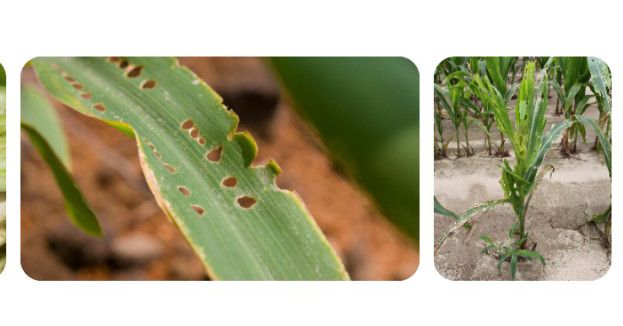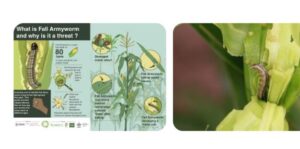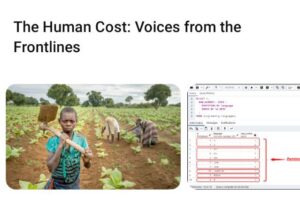By Alex Ababio
The first sign of trouble was the leaves. Where once lush green maize plants had stood, now only skeletal remains remained, their veins picked clean under the fading twilight in the small community of Bolove‑Nolope, in Ghana’s Volta Region. Farmer Godwin Emmanuel Gbekle had watched the creeping brown tide advance across his fields. Then came the morning when he discovered them — thousands of caterpillars, marching in formation, consuming everything in their path.
“In forty years of farming, I have never seen destruction like this,” Gbekle says, his voice barely above a whisper as he crumbles dry soil between his fingers. “We have been tending to our crops for months, and to see them destroyed in a matter of days is heartbreaking.”
In Bolove-Nolope, the invasion has already destroyed over 50 acres of crops — maize, okro, tomato, pepper — all nearing maturity, all now lost. The invasion threatens not just a harvest season but an entire way of life in this agrarian community where most families depend on their fields for food and income.
The Science of the Invader
The culprit is the Fall armyworm (Spodoptera frugiperda)—despite its name, not a worm at all but the larval stage of a moth of the Noctuidae family. These nocturnal fliers lay eggs that develop into caterpillars capable of reaching two inches in length — and are identified by a distinctive inverted-Y mark on their heads.
“What makes armyworms exceptionally destructive is their biology and behavior,” explains Ken Okwae Fening, an entomologist who has studied the outbreak in Ghana. “They’re prolific breeders, with females laying up to 1,000 eggs in their brief lifetime. They get their name from their behavior of moving in large groups, like an army, devouring everything as they go.”
The species devastating Ghana’s farms is believed to be the fall armyworm, native to the Americas, first confirmed in West Africa around 2016 and now spreading rapidly. Research published in 2023 finds that these pests can adapt their gut bacterial communities so as to better digest diverse host plants — meaning whatever crop you plant, they may learn to eat it.
A single caterpillar can consume its own body weight in food every day. Two larvae can devour an entire ten-day-old maize plant; in large numbers, they can strip a field bare in 48 hours.
For smallholder farmers like Gbekle, it isn’t just a nuisance — it is a calamity.
Ghana’s Long History with Armyworms
While the current crisis in Bolove-Nolope feels unprecedented to farmers, Ghana has battled armyworms for decades. The National Disaster Management Organisation (NADMO) records armyworm invasions as far back as 1999, affecting the Northern Regions, Ejura in Ashanti, and Dahwenya in Greater Accra.
What has changed recently is the frequency, the scale—and the stakes.
When fall armyworm was first confirmed in Ghana in 2016, early studies forecast maize production losses of up to 45 per cent, threatening millions of dollars in revenue.
According to a 2024 study in two maize-growing enclaves of Ghana, the prevalence of larvae per plant reached up to 0.10 ± 0.04 larvae per plant in one district, indicating serious infestation levels.
In one report, 96.3 % of farmers who reported FAW (fall armyworm) attack had at least half their fields infested.
Ghana responded—including allocating funds and creating task-forces. A national multi-stakeholder task force was established and emergency measures taken.
But eight years later, smallholder farmers remain exposed.
A Global Threat with Local Consequences
This is not Ghana’s problem alone. Across Southern Africa, an outbreak of the closely-related African armyworm in early 2025 raised serious alarms for food security and economic stability. The pest thrives under warm, wet conditions and can cause devastating losses in mere days.
Economically, the impacts fall hardest on smallholder farmers — who form the backbone of agriculture in developing nations. Infestations reduce crop yields, inflate food prices, disrupt trade and strain government budgets.
As Ghana’s Ministry of Food and Agriculture declares, the fall armyworm is “an enemy to food security,” feeding on more than 80 plant species, including maize, sorghum, peanut, soy, rice, vegetables and more.
When a staple crop is under threat, the shockwaves ripple outward: to households, to markets, to national food security.
The Human Cost: Voices from the Frontlines
In Bolove-Nolope the destruction goes beyond statistics.
“Many of us farmers here primarily rely on crops to make a living and feed our families. As the crops are being destroyed now, we are left without any source of income or food for our families,” Gbekle says.
Another voice:
“This land has been in my family for generations,” says Ama Akuletse, a 52-year-old farmer who has worked the fields since childhood. “We survived droughts, we survived floods, but I have never seen anything this destructive. How will I feed my children? How will I pay for their school?”
Psychological distress hangs heavy. The loss of crops means not just lost income but lost dignity, lost hope.
Gbekle pleads,
“We are appealing for help from various government agencies and other stakeholders to provide the necessary assistance including pesticides and supports on how to control the devastating situation.
Systemic Failures and the Pesticide Dilemma
The armyworm crisis has exposed critical weaknesses in agricultural systems. Many smallholder farmers rely heavily on synthetic pesticides—often subsidised by the government—as their first line of defence. But this approach has created its own problems.
A 2020 study found that a majority of Ghanaian households using pesticides in response to FAW did so without proper personal protective equipment, and many used highly hazardous or even banned products.
The distribution of chemicals also masks deeper issues: inadequate extension services, gaps in monitoring, lack of coordinated response. As one research report found: delays in funding, weak consultation of farmers, and a disconnect between national policy and district implementation.
Amplifying the problem, other structural weaknesses loom:
“We lack adequate post-harvest facilities, including modern storage silos, processing plants, and efficient transportation networks,” an agriculture expert notes, pointing to how surplus crops become waste—another cruel paradox in a region where food security remains fragile.
Pathways to Solution: Integrated Pest Management
Sustainable solutions demand moving beyond ad-hoc chemical spraying toward a holistic approach: Integrated Pest Management (IPM).
Early detection and monitoring: Use of pheromone traps and surveillance enables farmers and extension officers to intervene before infestations escalate. The Food and Agriculture Organization (FAO) reports that Ghana recently trained 25 plant protection and extension officers in advanced FAW monitoring and predictive modelling under a South-South Cooperation project.
Biological controls and safer options: “We’re working with biopesticides derived from naturally occurring bacteria, fungi or viruses that specifically target armyworms while sparing beneficial insects,” says Dr Fening. Ghana’s collaboration with organisations like Centre for Agriculture and Biosciences International (CABI) has led to trials and launches of new biopesticide products.
Cultural practices like regular weeding, manual picking of egg masses and caterpillars, inter-cropping with non-host plants can reduce population pressure. Farmer-led innovations abound, from plant-extract sprays to homemade detergent mixtures.
Education and collaboration are central. “The government has integrated effective products into their schedule for control of the pest,” notes an agricultural input dealer who works with training programs. “This is significantly helping in the fight.”
A 2023 panel study in Ghana found that when farmers adopted biopesticides, used protective equipment and embraced cultural practices, “the negative effect of FAW infestation on maize productivity is not statistically significant.”
That marks a turning point—evidence that with the right knowledge and tools, the worst outcomes are avoidable.
Reasons for Hope
Despite the dramatic scenes in Bolove-Nolope, there are signs of resilience. In the scorched fields, you’ll sometimes find a surviving patch of okro, a reminder that not everything is lost.
“The situation in our community is a stark reminder of the importance of effective pest management,” Gbekle reflects, gazing toward the horizon. “We need the tools and resources to control these infestations.”
Nationally, Ghana’s ministry and international partners are stepping up. The FAO-supported project, for instance, seeks to train 50 farm-field school facilitators and 1,000 farmers over two seasons.
That means more maize farmers might soon be able to detect and respond before their fields are devoured.
Research also points the way: a 2024 study in Ashanti Region shows climatic variables (rainfall, temperature, humidity, wind) significantly impact armyworm severity — which means more targeted, region-specific strategies are possible.
Another paper finds that adoption of early planting, pesticide application, and their combination significantly improved yields and income.
A Way Forward
As twilight descends on Bolove-Nolope, Gbekle walks one more time through his ravaged fields. The silence is broken only by the crunch of decimated plants beneath his feet. Yet even here, in the destruction, there are signs of resilience—the patch of okro at the field’s edge, the determination in a farmer’s eyes as he plans his next planting.
“We have to be ready for the next wave,” he says. “This land is our home. We cannot wait until everything is lost again.”
His words carry beyond the Volta Region—to governments, researchers and communities worldwide facing similar threats. The armyworm invasion is more than an agricultural crisis—it is a test of our ability to adapt our food systems to changing realities, to balance immediate needs with long-term sustainability, and to support those who feed nations in their most vulnerable moments.
With the right combination of traditional knowledge and innovative science, of coordinated action and individual vigilance, the tide of this silent war may yet be turned. The armyworms will continue to come—but they need not continue to conquer.







